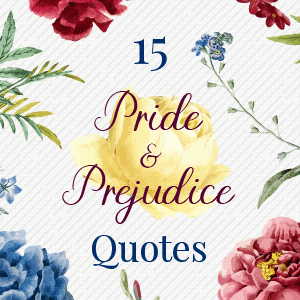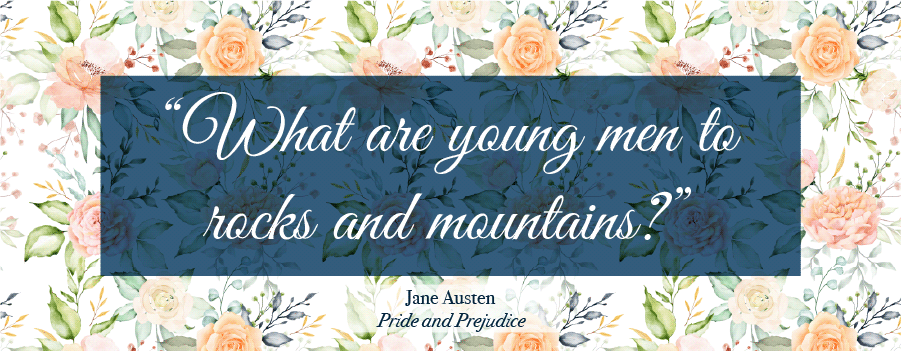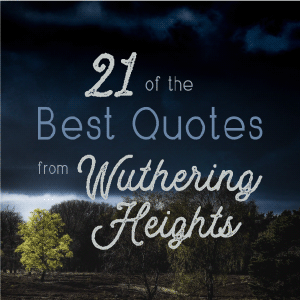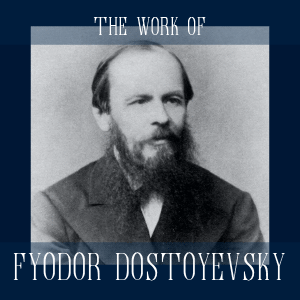15 Pride and Prejudice Quotes: Elizabeth Bennet, Mr. Darcy, and More

The debate over which Jane Austen novel is the “best” will most likely continue until the polar ice caps melt.
One thing all Janeites should concede, however, is that Pride & Prejudice will always remain Austen’s most popular work. Heck, Pride & Prejudice is so popular it has been filmed at least 11 times, including a successful vlog series called the “Lizzie Bennet Diaries” and a surreal zombie-infested spinoff!
There are many obvious reasons why readers have fallen in love with this Regency era novel of manners. For starters, there are the main characters: prideful Emma Bennet and the oh-so-prejudiced Mr. Darcy. Add some saucy side-plots, ironic twists, and Austen’s graceful prose, and you’ve got all the makings of a masterpiece.
There’s no better way to explore Pride and Prejudice‘s enduring popularity than to take a quick look at the text itself. So, without further ado, let’s dig into some classic Pride & Prejudice quotes.
The Most Memorable Quotes From Pride and Prejudice
“I declare after all there is no enjoyment like reading! How much sooner one tires of any thing than of a book! — When I have a house of my own, I shall be miserable if I have not an excellent library.”
It’s clear that Miss Bingly is more interested in making conversation with Mr. Darcy than reading her book when she utters this quote in Chapter 11. In reality, Jane Austen was the great bibliophile!
Although Jane Austen wasn’t given formal instruction, her father allowed her to read and write from a very early age. In addition to her father’s library, it appears Jane Austen rented any book she could get her hands on from circulating libraries.
Modern scholars believe a few key authors Austen would’ve been exposed to during her youth include Gothic novelist Ann Radcliffe, Dr. Samuel Johnson, and Tom Jones author Henry Fielding.
One author that undoubtedly held a prominent place on Austen’s reading list, however, was Samuel Richardson. Of all Richardson’s works, Austen seems to have derived a great deal of pleasure from The History of Sir Charles Grandison. Indeed, one of the only reasons people continue to read this novel nowadays has to do with the influence Austen derived from it in her fiction.
“A lady’s imagination is very rapid; it jumps from admiration to love, from love to matrimony in a moment.”
After Mr. Darcy tells Caroline Bingley he is thinking about Elizabeth Bennet’s eyes, Bingley jokingly asks him when his wedding is to be scheduled. The line above is Mr. Darcy’s sly comeback.
Although the quote is tongue-in-cheek, there’s a lot of truth here. It’s not an understatement to say that marriage is a central obsession for female characters not only in Pride & Prejudice, but in all of Austen’s fiction. Many women like Caroline Bingley are hyper-alert to signals of affection from “competition.” Any threat to a “good match” could mean the difference between a life of relative comfort and the poor house for many women during this period.
“It is a truth universally acknowledged, that a single man in possession of a good fortune, must be in want of a wife.”
Every list of World Literature’s most famous opening sentences must include this gem from Pride & Prejudice. It’s almost annoying nowadays to see how many amateur writers steal the “truth universally acknowledged” bit to add a bit of class to posts about anything from online dating to traveling in business class.
Indeed, this opening phrase is used so un-ironically in contemporary articles that many people nowadays fail to see its most important feature (i.e. its irony)! Right after introducing the reader to this “universal truth,” Austen describes how Mrs. Bennet is stressing herself out trying to match her daughters. It doesn’t appear the wealthy Mr. Bingley needs a wife; rather, it’s the lower class ladies that need Mr. Bingley.
-

“What are young men to rocks and mountains?”
Jane Austen was writing at a time of great transition in European thought and literature. While the start of the 18th century was characterized by Enlightenment ideals (e.g. rationality), Romantic writers at the start of the 19th century placed a greater emphasis on emotions and the irrational.
Even though Pride & Prejudice can’t be considered a Romantic novel, we can glimpse some Romantic elements such as this quote from Elizabeth Bennet. A celebration of the natural world as opposed to industrialized society was one of the central tropes in Romantic thought and artistry.
Readers who are interested in experiencing Austen at her most Romantic, however, must read her last fully completed novel Persuasion, which was published posthumously in 1817.
“How little of permanent happiness could belong to a couple who were only brought together because their passions were stronger than their virtue.”
The dangers of the “passions” can be found in many of Jane Austen’s works, and it’s shown most vividly in Lydia Bennet’s elopement with George Wickham. This quote from Chapter 50, which directly refers to Lydia and George’s elopement to Gretna Green, is easy ammo for those who read Austen’s novels as espousing conservative values rather than radical feminist ideas.
In case you were wondering, Gretna Green is a real place in Scotland and it had a reputation back in Austen’s day as a kind of Las Vegas…at least marriage-wise. Believe it or not, thousands of young couples fleeing their parents were married in blacksmith shops in Gretna Green throughout the 18th and 19th centuries. The parish, which is about a two-hour drive south of Edinburgh, still does a fine wedding business!
“How despicably I have acted!” she cried; “I, who have prided myself on my discernment! I, who have valued myself on my abilities! who have often disdained the generous candour of my sister, and gratified my vanity in useless or blameable mistrust! How humiliating is this discovery! Yet, how just a humiliation! Had I been in love, I could not have been more wretchedly blind. But vanity, not love, has been my folly. Pleased with the preference of one, and offended by the neglect of the other, on the very beginning of our aquaintance, I have courted prepossession and ignorance, and driven reason away, where either were concerned. Till this moment I never knew myself.”
This quote occurs in Chapter 36 after Elizabeth Bennet reads through a letter by Mr. Darcy that reveals why he broke off the Jane Bennet and Mr. Bingley’s relationship and the reason for his dispute with Wickham. This second revelation dramatically alters how Elizabeth Bennet perceives not only Mr. Darcy and Wickham, but also herself. To be more specific, Elizabeth Bennet is forced to confront her unfounded prejudices and excessive pride (always keep the title in mind!).
While we’re on the subject of letters, did you know that Pride & Prejudice was originally written in an epistolary form? We don’t know exactly why Austen scrapped this structure, but many of the letters in the final version of Pride & Prejudice were taken from Austen’s original drafts.
“There are few people whom I really love, and still fewer of whom I think well. The more I see of the world, the more am I dissatisfied with it; and every day confirms my belief of the inconsistency of all human characters, and of the little dependence that can be placed on the appearance of merit or sense.”
Elizabeth Bennet makes this rather misanthropic remark to her kind-hearted sister Jane Bennet in Chapter 24. Elizabeth’s opinion here is strongly influenced by her friend Charlotte Lucas’s recent announcement that she will wed the silly Mr. Collins.
Charlotte’s marriage to Mr. Collins is one of the more somber shades in this otherwise bright novel. Since she just turned 27, Charlotte feels she has no choice but to marry Mr. Collins for financial security. Although it might not be the match Charlotte wanted, it’s the only way she feels she can secure a comfortable life given the circumstances.
By the way, Elizabeth’s close relationship with Jane closely mirrors Jane Austen’s relationship with her elder sister Cassandra Austen. Unlike the Bennet sisters, however, both Cassandra and Jane remained unmarried for their entire lives…so perhaps there was another option for Charlotte?
“Angry people are not always wise.”
The narrator specifically refers to Miss Bingley in this quote in Chapter 45. As always, Miss Bingley is super-jealous of the affection Mr. Darcy appears to be showering upon Elizabeth Bennet.
Interestingly, modern day science proves that angry people aren’t wise when it comes to health and wellbeing. Research out of the American Psychological Association found that people who are easily triggered by daily stressors have a three-times greater risk of experiencing a heart attack than those who are calm and collected. So, do yourself a favor and relax with a Jane Austen novel every now and again. Your heart will thank you!
“They walked on, without knowing in what direction. There was too much to be thought, and felt, and said, for attention to any other objects.”
This is the moment everyone has been waiting for: Mr. Darcy and Elizabeth Bennet now have a moment alone together to express their true feelings. This quote, which occurs in Chapter 58, shows the complicated emotions rushing through both of these lovebirds’ minds before they decide to get hitched.
Unfortunately, Austen’s relationship with her own “Mr. Darcy” didn’t turn out as picture-perfect. Most biographers believe Austen based Mr. Darcy at least in part on a lawyer named Thomas Lefroy. Although we don’t know the whole story, it appears Austen and Lefroy had a close relationship for about a year until Lefroy unexpectedly left England to pursue a legal career in Ireland. We’ll never know the exact story of the Austen-Lefroy relationship, but it’s safe to say he had a big impact on her life.
“Vanity and pride are different things, though the words are often used synonymously. A person may be proud without being vain. Pride relates more to our opinion of ourselves, vanity to what we would have others think of us.”
Although Jane Austen’s novels don’t read like moral lessons, they most certainly have ethical teachings.
Some professors have even argued Austen’s novels espouse Aristotelian ethics…even though Jane Austen probably never read one book by the great Greek philosopher! This early quote from Mary Bennet reveals one of the major lessons Elizabeth Bennet, Mr. Darcy, and (hopefully) the reader will have to confront in this novel: the self-deceptive nature of pride.
English author Ronald Blythe was quite right to say, “Jane Austen can in fact get more drama out of morality than most other writers can get from shipwreck, battle, murder, or mayhem.”
“From the very beginning— from the first moment, I may almost say— of my acquaintance with you, your manners, impressing me with the fullest belief of your arrogance, your conceit, and your selfish disdain of the feelings of others, were such as to form the groundwork of disapprobation on which succeeding events have built so immovable a dislike; and I had not known you a month before I felt that you were the last man in the world whom I could ever be prevailed on to marry.”
Elizabeth Bennet directs these sharp words to Mr. Darcy after he proposes to her in Chapter 34. Considering Elizabeth Bennet’s lower financial status, it’s quite a bold move for her to refuse Mr. Darcy’s offer. It’s also fair to say that Bennet’s critique against Mr. Darcy’s character forces the haughty lord of Pemberley to seriously examine his prejudices.
While Elizabeth Bennet’s refusal of Mr. Darcy is often read as a feminist triumph, some readers aren’t so convinced Elizabeth is really only after “true love.” Indeed, Elizabeth Bennet really starts to warm up to Mr. Darcy after she visits his magnificent estate in Chapter 43.
As she starts to realize first-hand all the material comforts she threw away in Chapter 34, Elizabeth Bennet becomes increasingly haunted by the idea that Pemberley could’ve been her new home. Perhaps a portion of Elizabeth’s newfound attraction to Mr. Darcy could be related to more pragmatic concerns than romantic readers aren’t willing to admit.
“He is a gentleman, and I am a gentleman’s daughter. So far we are equal.”
This Elizabeth Bennet quote to Lady Catherine can be found in Chapter 56. Given Mr. Darcy’s higher status, Lady Catherine is understandably upset with her nephew’s decision to marry “beneath him.” To Lady Catherine’s protestations, Elizabeth Bennet comes up with this witty remark to “prove” her suitability for Mr. Darcy.
Unfortunately, recent surveys suggest that the strong legacy of the British class system remains in place to this day. Although there are greater opportunities than in Austen’s time, social scientists believe there are seven major class divisions within the modern UK that are very difficult to break out of. Roughly 6 percent of the country’s population now lives in what would’ve been considered Darcy’s class.
“There is a stubbornness about me that never can bear to be frightened at the will of others. My courage always rises at every attempt to intimidate me.”
After playing the piano in Chapter 31, Elizabeth Bennet makes this proud declaration to Mr. Darcy. Clearly this shows Elizabeth’s famed self-confidence and defiance…or does it?
Immediately after this quote, Mr. Darcy remarks, “I have had the pleasure of your acquaintance long enough to know that you find great enjoyment in occasionally professing opinions which in fact are not your own.” So, is Elizabeth Bennet just “putting on an act” to protect her ego against Mr. Darcy? Does she really believe everything she says, or does she use her words as defenses in a male-dominated society?
A closer reading of Pride & Prejudice quotes might reveal complex psychological insights into Elizabeth Bennet’s motives.
“You are too generous to trifle with me. If your feelings are still what they were last April, tell me so at once. My affections and wishes are unchanged; but one word from you will silence me on this subject for ever.”
This is another quote from the famous second proposal scene in Chapter 58. Mr. Darcy’s language here is quite different from his haughty proposal in Chapter 34, wouldn’t you say?
Through the twists and turns between these two chapters, both Elizabeth Bennet and Mr. Darcy are forced to humble themselves and re-examine their stubborn prejudices.
Indeed, it’s quite instructive to read these Pride & Prejudice quotes side-by-side to get a better sense of the moral development of these characters between the two proposal scenes.
“The distance is nothing when one has a motive.”
You can find this Elizabeth Bennet quote in Chapter 7 of Pride & Prejudice. After Jane Bennet receives an invitation to visit the Bingleys’ in Netherfield, Mrs. Bennet urges Jane to use a horse rather than a carriage so she’ll have to stay overnight. Unfortunately, this scheme actually makes Jane Bennet quite sick.
To comfort her sister, Elizabeth Bennet decides to walk three miles to Netherfield on her own. The harsh weather doesn’t seem to bother Elizabeth Bennet’s immune system as much as it does Jane’s. What’s up with that?
Interestingly, if you read through Jane Austen’s fiction, you’ll start to notice that many of her female characters are either very healthy or have some kind of physical malady. For instance, the intensely romantic Marianne Dashwood in Sense & Sensibility falls deathly ill at one point in the novel, but her more practical sister Elinor doesn’t really get too sick. If health is equated with “good,” it seems Austen praises female characters who are more independent and less prone to romantic swoons.
This idea is contradicted, however, by the characterization of Fanny Price in Mansfield Park. Strangely, Austen considered Fanny, who’s extremely prone to headaches, one of her greatest heroines. So, any PhD literature students reading this article, consider investigating how physical illness/health is used in Austen’s work for your dissertation!
That’s it for our 15 favorite Pride & Prejudice quotes! Which quote (or character) is at the top of your list?





Leave a Reply
Be the First to Comment!